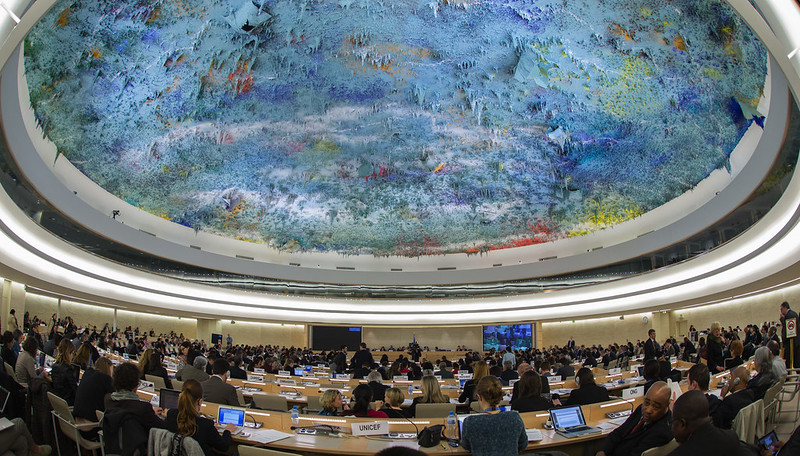On the forty-fifth session of the Human Rights Council (UNHRC) adopted a weak follow-up resolution proposed by Island and the Philippines itself which does not contain an investigative mechanism.
At the beginning of the session on September 14, 2020 Human Rights Groups had already warned that a follow-up resolution to the resolution Island brought in in the forty-first session in 2019 would have to include accountability for extrajudicial killings and an external investigation mechanism in order to effectively contribute to a significant improvement of the human rights situation and put an end to impunity in the Philippines. Philippine and International human rights groups published a joint letter before the session requiring the launch of an international investigative mechanism on the human rights situation. During the session, the Philippines together with non-member Island negotiated a so-called Zero Draft as a first proposal. Philippine human rights groups participated in further negotiations of the draft and could achieve some improvements of the Zero Draft.
Still, concerns are widespread that the Philippine government sees the resolution, which is an agreement on technical cooperation and has no independent investigation framework or third party monitoring included, more as a measure to “temper international pressure” than as an approach to serious engagement in the field of human rights.
The Philippine Commission on Human Rights commented that the resolution “fell short on expectations of the human rights community”. Amnesty International called the resolution a “missed chance for justice”
Background: The United Nations High Commissioner for Human Rights (OHCHR), Michelle Bachelet, published the report on the situation of human rights in the Philippines on June 4, 2020 in accordance with the UN resolution 41/2, adopted by the UN Human Rights Council (UNHRC) on July 11, 2019 at the forty-first session. Last Friday, June 26, 2020, 30 UN Special Rapporteurs published a joint statement calling for an on-the-ground independent, impartial investigation. On June 30, 2020, the OHCHR’s report on the human rights situation in the Philippines was subject to an Enhanced Interactive Dialogue during the 44th session of the UNHRC in Geneva. HC Michelle Bachelet gave a statement on the situation of human rights in the Philippines, where she explicitly refered to the anti-terror bill that “heightens our concerns about the blurring of important distinctions between criticism, criminality and terrorism.” Meanwhile, the Philippine Government represented by Justice Secretary Menardo Guevarra stated at the UNHRC, that the government’s campaign against illegal drugs are “always within the law and in respect of human rights.” A network of human rights advocates, Ecumenical Voice for Human Rights and Peace in the Philippines (EcuVoice), said it cannot help but be cynical on the statements presented by the Philippine government. The Asia Pacific Forum on Women Law and Development (APWLD) submitted a written statement in beforehand and drew special attention to the worsening human rights situation in the Philippines amid the impacts of the COVID-19 pandemic. The International Federation for Human Rights (FIDH) and CIVICUS together with Karapatan gave an oral statement. On June 29, 2020 CIVICUS had already put the Philippines on their Monitor Watch List due to serious concerns regarding the exercise of civic freedoms. CIVICS mentions the restrictions on press freedom, the deteriorating situation for human rights defenders and the threat through the new ant-terror bill. Finally, Senator Leila de Lima published a statement, on June 30, 2020, “in support of the call to establish an independent international investigation into human rights violations in the Philippines and to expedite the proceedings in the International Criminal Court”.
Further information:
Rappler Investigative Coverage: Duterte’s war on dissent
Rappler on Michelle Bachelet’s statement not to sign anti-terror bill

